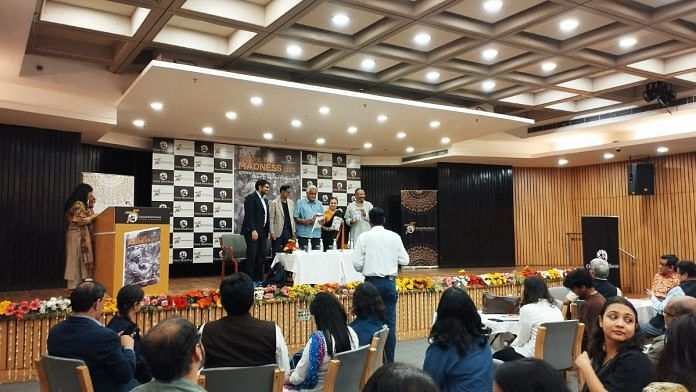New Delhi: The eager-eyed and spirited audience in Delhi’s India International Centre was pushed out of their comfort zone when sociologist Shiv Vishwanathan opened the evening’s session by saying — If you want to enter the art of darkness today, welcome to nationalism.
He was one of the five panellists who delved into the topics of identity, nationalism, citizenship, homeland, and the notion of the nation.
They were speaking at the launch of Where the Madness Lies: Citizen Accounts of Identity and Nationalism written by Kishalaya Bhattacharjee, journalist and dean of the Jindal School of Journalism and Communication and published by Orient Blackswan.
Through the book, Bhattacharjee says he wants to persuade one to rethink the dominant imaginations of ‘Indianness’ and bring back a sense of plurality to the idea of being Indian.
“I started working on the book just before the pandemic. The regions that I was covering, I felt, were invisible. I have written this book to record the voices of these invisible citizens,” Bhattacharjee told ThePrint.
He travelled to Shillong, Jalandhar, Varanasi, Guwahati, Hyderabad and Hampi in the last few years. He uses the voices of the residents of these cities in his book to try to inform what it means to be a citizen.
Bhattacharjee makes poignant use of family histories, personal memories, and experiences of migration and displacement to elaborate on the theme of identity in the book.
‘Before the pandemic, there was the CAA-NRC, there was the abrogation of Article 370. I felt that the rights of the common citizen and the everyday problems that citizens face in this country are almost pitted against the state. As if it’s state versus citizen,” he said.
Also Read:
An idea of citizenship
During the session, a few members of the audience were whispering among themselves about how the participation of women in the country has been made invisible. But as soon as constitutional law scholar and science fiction writer Gautam Bhatia took the dais, their attention turned to the stage. He spoke about how the Partition didn’t allow a fruitful discussion regarding citizenship in Parliament.
He expanded on the two principles of citizenship — jus soli and jus sanguinis.
‘Jus soli’ confers citizenship based on place of birth, ‘Jus sanguinis’ recognises blood ties.
He highlighted the lack of debate in Parliament on the notion of citizenship in the Constitution.
“If you look at the history of citizenship laws over time, you see a gradual shift from Jus soli to Jus sanguinis,” he said. “Each amendment narrows the definition of citizenship and makes it about bloodline, descent and less about being here.’
He also argued that the Citizenship Amendment Act (CAA) makes religion a basis of citizenship.
Also Read: ‘Religion is faith, not politics’—S Irfan Habib’s book on Maulana Azad has lessons for today
Caste and political economy
For the founder and national convenor of the Safai Karmachari Andolan, Bezwada Wilson, identity is not a superpower. According to him, we don’t recognise that not every Identity has the same value. We come with a hierarchical understanding of citizenship.
“Our cities and village are built based on caste. We don’t even have a single village in the country which does not have caste,” said Wilson, adding that it is still a barely discussed issue.
Members of the audience expressed disappointment that political economy was not part of the discussion.
“There was no mention of political economy and capital accumulation, I think that will be missing from the book as well We subjects become citizens when we move from monarchy to modern state,” Rakhi Sehgal, a 40-year-old workers’ rights activist told ThePrint. “The roots of social oppression and discrimination lie in political economy. This is also an important issue related to social identity and citizenship.”
Others said that the book is about finding oneself by exploring others.
“I think these stories challenge dominant imagination. The idea of the book is to be able to challenge the status quo,” said Bhattacharjee.
(Edited by Theres Sudeep)



